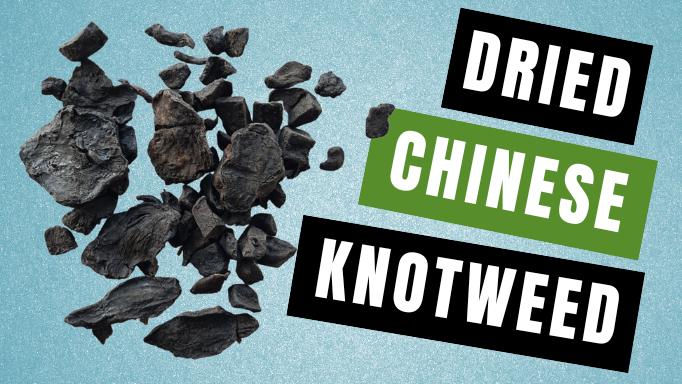
Chinese Knotweed is a fast-growing climbing plant native to Asia. It’s well known for its ability to spread rapidly and is even considered a pest to some. But it’s also garnered a reputation for its potential medicinal uses* and ability to transform tea.
While its propensity to overtake large areas and endanger other flora does make it an issue to land cultivators, we want to appraise the dried form of Chinese Knotweed on those latter characteristics. Spoiler alert: on that front, it’s all positive!
So, if you’re curious about what the secretly versatile dried Chinese knotweed can bring to your kitchen (and what it could possibly bring to your overall health*), then you’re right where you need to be.
What is Dried Chinese Knotweed?
Also known as Fo-Ti, Persicaria chinensis is a herbaceous vine that originated in China, but now appears all across the globe. It’s what’s known as a perennial plant, due to its leaves and stems being present throughout the entire year.
Pre-harvest, it has a long, thin cherry-red stem and vibrant green leaves that span light and dark hues. While it receives a lot of justifiable vilification, Chinese Knotweed might possess latent health benefits, and it can even offer experimental herbalists a fresh edge to their morning tea.
Keep an eye out for it whenever you’re next outdoors, as it’s highly likely you’ll see this prolific plant regularly. Though if you are going to praise it, make sure you’re not within earshot of a gardener – you might suddenly have to dodge a head-bound spade!
What are the Potential Health Benefits of Dried Chinese Knotweed?
Dried Chinese Knotweed has been used in Traditional Chinese Medicine for centuries. It’s been prized for its potential to reinvigorate brain cells, tonify the kidneys, recalibrate yin, supplement weak skeletal structure and much more*.
Additionally, there’s clinical data to suggest that Chinese Knotweed might also have a set of observable medicinal benefits*. They include, but are not limited to:
- Anti-inflammatory
- Anti-bacterial
- Antiviral
- Anti-tumour
- Antioxidant
Further study is required, but the initial results are promising, and seem to suggest that TCM might just have been onto something. But it’s not just about its potential benefits – there’s a far more tactile joy to be taken from this industrious herb.

How to Make Dried Chinese Knotweed Tea
It might seem a bit radical, but dried Chinese knotweed makes a fantastic addition to herbal teas, especially for those who enjoy a challenging taste profile! Making it is super easy, as you’ll find out below.
What you’ll need
- 1.5 g of Dried Chinese Knotweed
- Boiled water
- Herbal tea bag of your choice
- ½ tbsp of demerara sugar
Method
- Bring water to a boil in a pan. Add 1.5 g of dried Chinese knotweed to it, then boil for about 10 minutes. Take the water off the boil, then leave it to sit.
- Boil a kettle and pour the water into a cup. Infuse your chosen herbal teabag. Drain the dried Chinese knotweed, then pour it into the cup. Stir for 1 minute, then leave to steep for another minute.
- Add ½ tbsp of demerara sugar for a sweet kick. Steep for a further two minutes, then remove the herbal teabag.
You’re good to go. Enjoy your new, innovative tea, and don’t forget to tell us what you thought of it (or if you’d add anything to the recipe) below!
Summary
The much-maligned Chinese knotweed has its detractors, and we see their point. But we think there’s so much more to this herbaceous wonder-plant than meets the overgrown garden, and that there’s still a lot more to be discovered.
Until then, dried Chinese knotweed can electrify your tired teas and might even have some possible medicinal benefits too.
If you're after some more fresh and exciting herbal tea twists, our blog on Dried Cinnamon Bark has a section just for you. If you already know what you want, our entire loose herb selection is currently enjoying its best-ever discount: get 25% off for a limited time only!

*Dried Chinese Knotwood can be liver toxic if taken irresponsibly. Please use with caution. Vita Herbal Nutrition cannot guarantee the positive effects of its products. Results may vary. Our products are not designed to treat medical conditions or diseases, and have not been evaluated by food and drug administrations.


